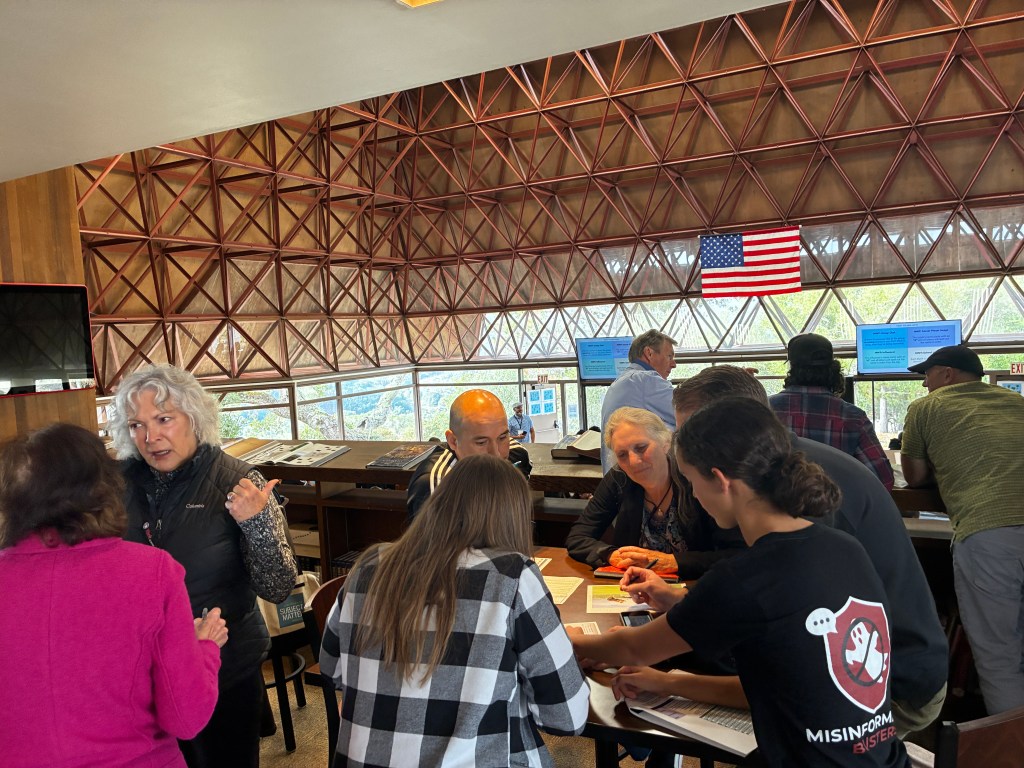Listen to the article
High School Takes on Misinformation Crisis with Educational Event
Under the tall steel-beamed ceiling of York School Library in Monterey, junior Esther Spaulding peered over her peers’ shoulders as they tackled a challenging puzzle: determining what’s fact and what’s fiction in today’s news media.
Spaulding, alongside co-editor Sofia Fejia-Contreras of the York School newspaper, led a “Misinformation Buster” activity as part of a broader “Misinformation Day” event held last Friday. The initiative aimed to equip students and educators with critical tools to navigate today’s complex information landscape.
“We’re in a very difficult time of misinformation in this country and the world,” explained Fejia-Contreras. “We’re trying to give students and educators the resources to battle that and to not let themselves be fooled by what the world is giving them.”
Spaulding noted how easily people can fall prey to false information, particularly in the social media era. “The first instinct is always to assume it’s true, but that’s what we’re trying to break,” she said.
The event featured presentations by media literacy experts, including Nolan Higdon, a political analyst, author, and lecturer at UC Santa Cruz who specializes in critical media studies. Higdon emphasized that while misinformation isn’t new, each technological advancement brings fresh challenges.
“It’s always been a plague for humans because one of the coolest things about being humans is we can imagine and create,” Higdon explained. “But it also means we can imagine and create total nonsense.”
Higdon highlighted the democratic implications of widespread misinformation. “Democracies are predicated on the idea that people use the truth to make decisions,” he said. However, he warned that when “a handful of corporations control the flow of information,” the landscape becomes “skewed toward making money, not informing people,” resulting in “a bad media and a civically illiterate public.”
Dan Gurska, a humanities teacher at York School, helped organize the event in collaboration with the Media Literacy Coalition and the University of Washington’s Center for an Informed Public. He believes the initiative addresses a critical gap in modern education systems struggling to keep pace with rapidly evolving information technologies.
“These students have an inundation of information,” Gurska observed. He expressed concern that in today’s digital environment, where content is curated by profit-driven algorithms, truth often becomes obscured. “When you inundate a kid on TikTok with 30 different falsehoods, that inundation makes it more subtle in nature. People get caught up and swept away in the flood of information.”
While Gurska reminisced about his younger days when libraries were his primary “deluge of information,” he’s not opposed to technology. Instead, he advocates for educational systems that evolve alongside technological advancements.
The event attracted students and teachers from across Monterey County, who participated in various hands-on activities designed to develop critical thinking skills when consuming media. As participants worked through fake-news puzzles, Gurska noted that events like “Misinformation Day” signal growing recognition of the challenges posed by what he calls “the misinformation age.”
“People are finally investing in it,” he remarked, expressing cautious optimism about this educational shift.
The York School initiative represents part of a broader national movement to integrate media literacy into education. As social media platforms and artificial intelligence continue to transform how information is created and consumed, educators are increasingly recognizing the need to adapt their teaching approaches.
By bringing together students, teachers, and experts for collaborative learning, York School’s “Misinformation Day” offered a promising model for how educational institutions might prepare young people to become more discerning consumers of information in an increasingly complex digital landscape.
Fact Checker
Verify the accuracy of this article using The Disinformation Commission analysis and real-time sources.




13 Comments
It’s encouraging to see schools prioritizing media literacy. With the rise of misinformation, students need to develop the skills to discern truth from fiction. This event seems like a valuable learning opportunity.
Interesting to see high schools taking on the misinformation challenge. Critical thinking skills are so important in today’s information landscape. I hope this initiative helps students develop a healthy skepticism and ability to fact-check claims.
Agreed, media literacy is a crucial life skill for students to cultivate. Equipping the next generation with the tools to navigate misinformation is a commendable effort.
Misinformation Day sounds like a valuable learning experience for students. Equipping them with the tools to navigate today’s complex information landscape is a wise investment in their future. Kudos to the school for taking this on.
Absolutely. Fostering media literacy skills at a young age will serve students well throughout their lives. It’s a crucial life skill in the digital age.
Addressing the misinformation crisis in schools is a smart move. Students need to be equipped with media literacy skills to avoid falling victim to false claims, especially on social media. I hope this event has a lasting impact.
Agreed. Teaching young people to think critically about online content and verify information is a crucial investment in their future.
Kudos to the York School for tackling this important issue head-on. Giving students the tools to navigate today’s complex information landscape is crucial. I hope other schools follow this example.
Absolutely. Cultivating a healthy skepticism and fact-checking habit at a young age will serve students well throughout their lives.
Misinformation Day sounds like a great way to raise awareness and give students practical tips. The social media era certainly makes it easier for false claims to spread rapidly. Kudos to the school for taking this on.
Yes, teaching critical evaluation of online content is so important. Fact-checking should be a fundamental part of media consumption, especially for young people.
Misinformation Day sounds like a great initiative. Arming students with critical thinking skills to discern truth from fiction is vital in the digital age. It’s an important life lesson they’ll carry forward.
This is a great initiative by the York School. With the proliferation of misinformation, developing critical thinking and fact-checking abilities is essential for students. I commend the school for taking this proactive approach.